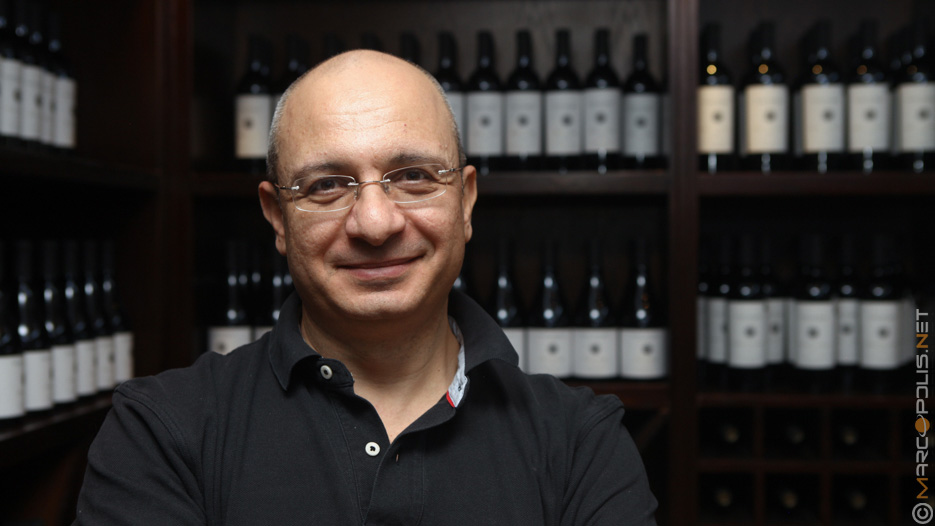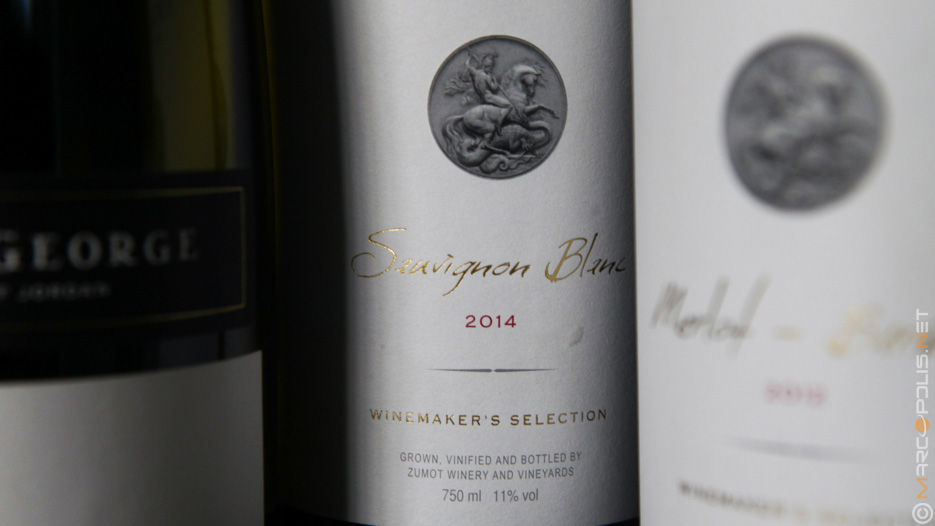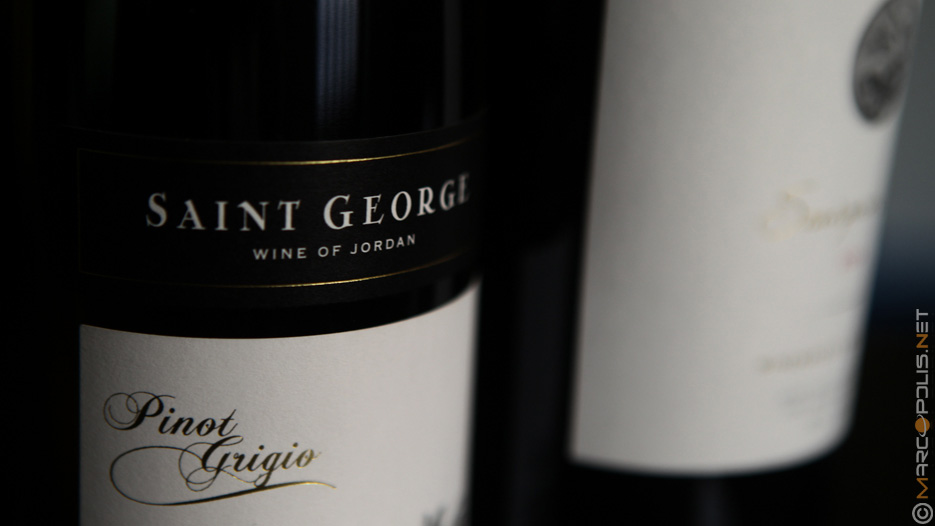Zumot Wines: “Jordanian Wines Have Great Potential, They Reflect the Nature of Jordan”
“My father always believed that this country could produce one of the greatest wines in the world. I don’t think he is mistaken.”
Interview with Omar Zumot, the Winemaker (Zumot Wines, Saint George)

Let’s start with the overview of the wine industry in Jordan, the size of the industry and the market position of some of the wines.
The Jordanian wine industry has been around for some time now. It went through a major revival twenty years ago. The quality of wine has improved dramatically since 1999 or 2000. In Jordan we produce about 1 million bottles of wine every year. The major market for Jordanian wine is our tourism sector. We sell our wines to tourists who come here and want to explore Jordan and get to know more about the country and its wine. It is part of the gastronomic experience that we offer to the tourists. Unfortunately last year the industry saw a decline in terms of quantity produced but luckily the quality has improved greatly.
We dominate the upper range of the Jordanian wine, so the more expensive, luxurious and natural range. We always say that our wine is the reflection of the Jordanian nature in a glass. We don’t try to do anything with the wine; we just offer the weather of that year in a bottle. We have developed many techniques that help produce a unique wine with its own personality, of course starting with the vinification techniques and the agriculture methods that we have specifically developed for our Zumot vineyards.
You mentioned that the main consumers are tourists coming to Jordan, is any fraction of the production being exported?
Very little. The problem is that we as a country don’t have the accreditation to export on a commercial level to Europe. There is a certificate that the Jordanian government should have which unfortunately we don’t. We don’t have a wine law as such in Jordan so exporting to Europe on a commercial level is very difficult. We do export to some countries in the Far East and to the States and to Europe we do export a little but on a personal level. The moment that you reach more than 100 litres or 200 litres per shipment, it is considered commercial and it needs to come from a country that has a wine law, which unfortunately we don’t have and I don’t see it happening in the near future.

You said that you cater for the high end, luxury tourists…
I would say our main loyal customers are the expats in Jordan. They come with some good wine knowledge, they taste the wine, they like it and they stay married to it until they leave the country. They are our biggest customer base.
How do you market the wine? How do you make the tourists associate with it when they come to Jordan?
Basically our biggest technique is tasting. Seeing is believing. You taste the wine and you either like it or you don’t; luckily many people do like it. We have many ambassadors who have tasted the wine before and liked it and have recommended it to their friends and guests. We rely mainly on word of mouth. We are present in almost every 5 star hotel in Jordan and in the good restaurants where we think the brand association benefits our brand. We try to focus on the places that tourists go to. Basically the moment of truth comes when you taste the wine; when you have your first sip and you either go on to keep drinking or you decide to drink something else.
Do you have some specific tasting events for tourists?
Of course. We do this all the time. We never say no to any tourists that come here. We don’t look at this from a commercial point of view; we look at it as promoting Jordan. Having a country with a wine culture means much more than just producing wine, it means tolerance, civilisation and much more.
We have reached the stage where we can offer the consumer a wine that says “I am Jordanian”, a wine that has the character of Jordan, a wine that has the harsh desert, the very cold winters, the sun and the depth of taste.
What are your challenges nowadays with regards to Zumot wines and daily business in Jordan, apart from the fact that you can’t export to Europe?
The main thing is that we rely a lot on tourism and tourism in this country is very much affected by the economic and political situation in the countries around us. Secondly, we are a natural product so we are at the mercy of nature and that means that you never know what can happen, it could be too hot or too cold.
Tell us more about Zumot Wines, what is the history and philosophy of the winery?
My father’s vision was always to produce a great wine of Jordan and he always believed that this country could produce one of the greatest wines in the world. I don’t think he is mistaken. The wines that we have produced have proven that this country has great potential. It has been his dream and passion to do such a thing and it has been up to me to plant and do the hard work. There are a lot of wines in the world; people are not short of a new wine country to discover so our philosophy was to produce a wine that reflects the nature of the place that it is grown in. We took a very hard path, we tested more than seven different viticultural areas in Jordan, and we tested more than 34 different varietals. We have tested everything you could imagine in wine agriculture and wine making. We believe that now we have reached the stage where we can offer the consumer a wine that says “I am Jordanian”, a wine that has the character of Jordan, a wine that has the harsh desert, the very cold winters, the sun and the depth of taste. To produce a very strong Jordanian red wine is not a difficult mission; you need an idiot to produce a bad wine in this country. It is really given as a gift, you just take a great grape, press it and it converts itself into great wine; we really do very little.

Can you mention some of your flagship products?
I love my Cabernet Sauvignon. In 2009 it was awarded a gold medal in Mundus Vini in Germany. One of the wines that everybody likes and that I have a soft spot for is our Shiraz; it is a wine that really has everything in it: it has the fruit, the body, the depth and the colour. It really is a very interesting wine; you can drink it alone or with a strong steak; it is a wine that has everything.
You mentioned that you got an award for the Cabernet Sauvignon in Germany. Have you received other awards?
We have up to now received more than 28 different medals. To be honest the reason we go to these competitions is not for the medals but to show people that we have a wine that can be shoulder to shoulder with international wines. The medal that I really acknowledge is when the consumer genuinely likes the wine, not just somebody who is drinking because of the label. I want people to drink the wine and enjoy it. I think this is the most important thing. You don’t care about the wine’s medals if you don’t like it yourself. Our greatest achievement is when I hear a compliment from a consumer. That is what I like.
What is your strategy for 2016? What are your production goals?
Actually we don’t have any plans to increase our production in terms of quantity. On the contrary we are slightly reducing the quantity that we are selling because now we have higher benchmarks that we have reached and so we cannot go below them. Many of the wines are now distilled; we have set a quality level and if the wines don’t reach that level they are distilled. Because of the fact we cannot export, we have lots of limitations and so we would like to only offer a premium, natural, honest wine. This is our mission. This is a never ending story. With wine you don’t get forgiven very easily; if you make one mistake the whole year is gone. It keeps you on your toes all the time.
Is there anything that you would like to announce regarding next year?
To be honest, in terms of investment we have done the major aspects. We have planted more than 1.3 million trees and we have done so many experiments over the past twenty years. Now it is time for us to start reaping the fruits of what we have planted. There is no major investment on the cards. We are going to install a new bottling line to be more accurate when it comes to the bottling phase because our old bottling line is depleted now. Other than that, with wine as I said earlier, every year is a new story; it is the new vintage, the new celebration, the new gift. We are in a situation now where we have to maintain our position. To reach the top is easy but to stay there is difficult. Now our mission is just to keep and maintain the level of quality that we have, regardless of how much we produce. This year we distilled more than 200,000 litres because we didn’t like them, but what we are left with are gems. I have now in 2015 some of the greatest wines that we have ever produced. In two or three years we shall open them, with wine you have to be patient!
As you certainly know Chateau Ksara and Kefraya have huge estates in the Bekaa Valley and they organise trips for tourists to stay and visit the vineyards etc. Is this something that you are looking into?
We have something similar but unfortunately our vineyard is exactly on the Syrian border so it is a very well protected area now and people cannot go into our vineyard very easily because our fence is the fence of Jordan and there is not a very nice show on the other side. Until the whole situation calms down it will be little bit difficult to organise such events, although it was one of our major marketing strategies until 2 years ago. We were having at least once a week a big major event with guests, tourists and friends attending an open house where they came to enjoy the wine and the food. Now it is a little bit more critical.
That is very unfortunate. It must be impacting you in a great way.
Luckily our sales are going up. We have a deep rooted brand now, people know it and I know that many tourists come to Jordan with a list and on that checklist is to taste our wine. That is great and it is something I am really proud of. We don’t expect the situation to continue forever, so we hope to be back in action very soon. I am not saying that we don’t do it at all, but we don’t do it as much as we have in the past because sometimes safety comes first. We don’t want any problems from the other side of the border.
FAIR USE POLICY
This material (including media content) may not be published, broadcasted, rewritten, or redistributed. However, linking directly to the page (including the source, i.e. Marcopolis.net) is permitted and encouraged.